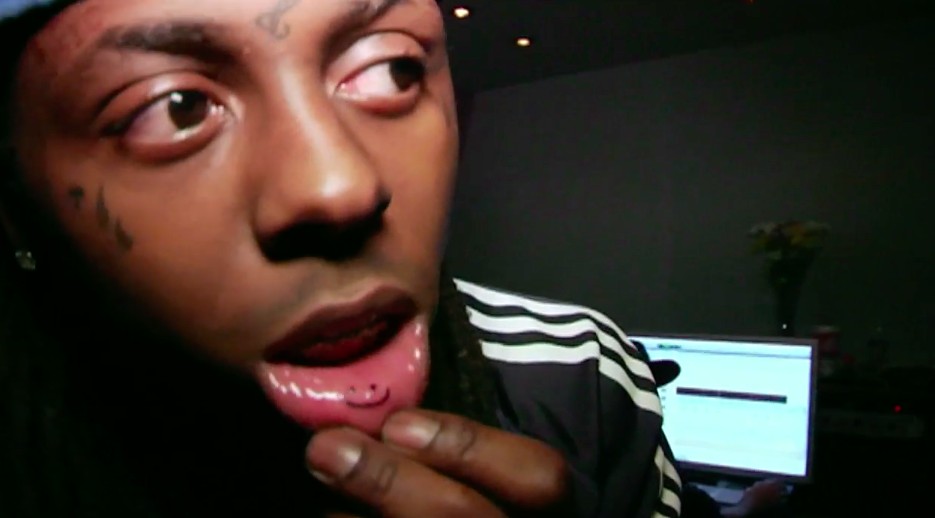 Adam Bhala Lough
/
Vimeo
Adam Bhala Lough
/
Vimeo
Before Lil Wayne angrily dismissed the Black Lives Matter movement in an early November Nightline interview — “I don't feel connected to a damn thing that ain't got nothing to do with me,” he said, “If you do, you crazy as shit” — the rapper was far more diplomatic in his rejection of the civil rights movement. There’s no such thing as racism, he calmly told Skip Bayless of Fox Sports in September, because people of all colors supported him. Whether black celebrities should speak up and support BLM or other anti-racist initiatives is a matter of ongoing discussion. But in a digital world, where mass incarceration is addressed by mainstream musicians at the Grammys, artists dismissing popular social justice initiatives risk serious backlash.
Watching Wayne’s Nightline interview, I thought back to The Carter documentary directed by Adam Bhala Lough, which was filmed over a six-month period in 2008. Wayne has since disowned the picture and unsuccessfully sued the filmmakers, who have uploaded the entire film online. In one key example of the film’s sensitive treatment of its priceless access to the rapper, the cameras capture the exact moment when Wayne and his team learn that Tha Carter 3 sold a million copies in a week, despite leaking 10 days prior. Featured on many “all-time best” music documentary lists, The Carter is an emotional feat of filmmaking as rare as platinum-in-a-week certification. But it also reveals how entrenched Wayne is in his music — and the toll that takes on his public persona.
“I’ve been on the road since I was 11 or 12 years of age… It’s nothing to me, it’s easy,” Wayne says before a show in Los Angeles. It’s implied that he’s talking about performing, but for most artists the rigors of the road are bundled with broader obligations of press and promotion. In The Carter, we witness some of this: Wayne in a series of identical swanky hotel rooms, cordial and patient with journalists despite being constantly asked to recount the time he shot himself. “[The] biggest misconception is that I’m some kind of rude… When they meet me they say [expletive] you so humble,” he said in the Nightline interview. And The Carter footage suggests this is true: he tosses an interviewer out just once, not because of something the poor fellow said but because he’s in a sour mood.
It’s pernicious to frame the rapper as some kind of race traitor; he’s just working with the same self-centered focus that took him out of Hollygrove as a kid and brought him onto a world stage.
Endearing as the interviews can be, despite resembling alien interrogation sessions, the viewer's perception of Wayne shifts to awe as we watch him record. The Carter offers a glimpse at the rapper's legendary prolific streak of mixtape releases during the the mid aughts. Wayne in musician mode is locked in, focused, masterful. I found the most humanizing moment to be when he was asked about the small black bag he carries with him that contains his mobile studio, which allows him the freedom to record whenever he feels like it. Wayne takes a small, wrapped portion from the bag. “The most important thing of this whole bag,” he said, before revealing the vital piece to be — what else? — the microphone. It’s half a joke, but the mock reverence he holds it with is that of a craftsman lovingly explaining a tool whose reliability has come to resemble an old friend’s, something that looks obvious but contains more layers than most people who use it will ever know.
“I can’t front, I listen to me all day,” he said, when asked how he scouts artists for his label, Young Money. “Only because I listen to me all day; what I should’ve said, what I didn’t say.” In another scene he tells a reporter that he doesn’t have time for sex. Several times we see Wayne recording by himself, including when he gets the news about Tha Carter 3’s first week sales. This work ethic — or workload he makes for himself — combined with his documented drug use appears to have an isolating effect. He openly expresses that he wished he didn’t have to pay child support for his loving daughter, Reginae. His manager and best friend, Cortez Bryant, nearly quits because of Wayne’s frequent self-medication with codeine (it’s unclear whether or not Wayne still uses the drug). For his entire career, Wayne has been enshrouded in the dark room of his studio. When the curtains occasionally open and the light lets in everything that’s happening in the world, he does what anyone else would do: he averts his eyes.
Wayne has a long-documented history of apoliticism. In 2011, he told Rolling Stone that he didn’t watch Obama’s 2008 inauguration. In October 2016, he responded “Who’s that?” when asked by The New York Times for his thoughts on Donald Trump. And he only acknowledged Hillary Clinton when she quoted one of songs. As social justice entrenches itself in youth culture, Wayne’s disinterest is compromising his career. But it’s pernicious to frame the rapper as some kind of race traitor; he’s just working with the same self-centered focus that took him out of Hollygrove as a kid and brought him onto a world stage. It’s not that his personality clashes with social consciousness, but to survive and flourish amongst the horrors of his upbringing, he had to keep working with the blinkers up. How can you tell someone with that background he’s wrong to not be connected?
